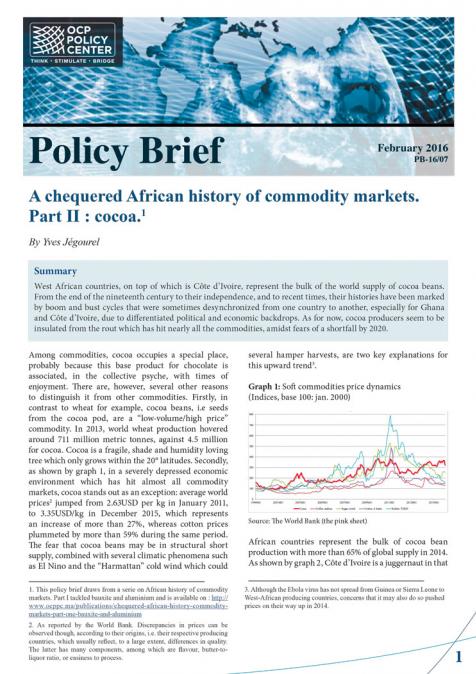Paul-Simon Handy, Regional Director for East Africa and Representative to the African Union, delves into the complexities of mediation in internal African conflicts. Despite half of the UN peacekeeping forces being deployed on the African continent, sustainable peace remains elusive. Mr Handy explores the reasons behind these challenges, shedding light on the intricate dynamics and obstacles that hinder effective conflict resolution.
RELATED CONTENT
-
AuthorsJean-Yves HaineFebruary 18, 2016Although the United States is less active in Africa than France, their security policies on the continent often have shared objectives and are sometimes pursued jointly. While the urgency of humanitarian crises has been at the centre of foreign interventions for a long time, now it tends to give way to the terrorist threat. The emergence and expansion of terrorist groups with a complex character, which are sometimes rivals of each other and claiming to follow radical Islam, has incr ...
-
 AuthorsOnasis Tharcisse A. GuedegbeFebruary 17, 2016The Food and Agriculture Organization (FAO) consecrated the year 2015 as the International Year of Soils (IYS). Therefore, it has been a year intended to raise the consciousness of humanity about the importance of this resource (soil) and the need to preserve it to ensure sustainable and shared prosperity. The various stakeholders in the management and use of this resource, particularly those of the agricultural sector have been called to enhance their consideration of this fragile ...
AuthorsOnasis Tharcisse A. GuedegbeFebruary 17, 2016The Food and Agriculture Organization (FAO) consecrated the year 2015 as the International Year of Soils (IYS). Therefore, it has been a year intended to raise the consciousness of humanity about the importance of this resource (soil) and the need to preserve it to ensure sustainable and shared prosperity. The various stakeholders in the management and use of this resource, particularly those of the agricultural sector have been called to enhance their consideration of this fragile ... -
AuthorsFebruary 16, 2016West African countries, on top of which is Côte d’Ivoire, represent the bulk of the world supply of cocoa beans. From the end of the nineteenth century to their independence, and to recent times, their histories have been marked by boom and bust cycles that were sometimes desynchronized from one country to another, especially for Ghana and Côte d’Ivoire, due to differentiated political and economic backdrops. As for now, cocoa producers seem to be insulated from the rout which has h ...
-
Tatiana Kastoueva-JeanFebruary 16, 2016Ce podcast est délivré par Tatiana Kastoueva-Jean. Les conflits extérieurs ont marginalisé la politique intérieure pendant plusieurs mois. Or, cette dernière est en train de « prendre sa ...
-
Yves JégourelFebruary 15, 2016Ce podcast est délivré par Yves Jégourel. La financiarisation des marchés des matières premières est un phénomène qui a pris de l’ampleur cette dernière décennie. Elle a ouvert en effet d ...
-
Héctor Sánchez MargalefFebruary 09, 2016This podcast is performed byHéctor Sánchez Margalef. Raval is a multicultural quarter in the center of Barcelona and CIDOB has a porject about integration and development in this area. Wh ...
-
AuthorsFebruary 8, 2016Brazil is in a good position to serve as a bridge to Africa and to reignite more cooperation between both sides of the South Atlantic. Brazil has increased its presence in Africa in recent years in terms of trade, investment, development cooperation, and political alliances with the goal to secure a greater say for the global South in the new world order that has been under construction since the of the Cold War. This has been pursued through financial support and proactive economic ...
-
AuthorsPhilippe ChalminFebruary 4, 2016Rarement, la tendance sur les marchés mondiaux de matières premières et de commodités aura été aussi marquée qu’en 2015. Pratiquement tous les marchés se sont inscrits en baisse et celle-ci a été en général très forte à l’image de l’indice Cyclope-Rexecode en retrait en moyenne de 38 % en 2015 par rapport à 2014. Il est à la limite plus simple de citer les quelques produits pour lesquels le bilan de l’année a été positif : le cacao et de manière plus anecdotique le thé et l’huile d’ ...
-
John SeamanFebruary 02, 2016Récemment la Chine a été considérée comme la bête noire des négociations internationales sur le changement climatique, mais lors de la COP21 à Paris en 2015, le pays a été largement félic ...
-
AuthorsFebruary 1, 2016Industrial policy is a controversial, even taboo, subject in policy circles. Yet it is widely practiced by advanced and developing countries alike2 . This note tries to make sense of this paradox. It argues that industrial policy can be a useful weapon in the development policy arsenal. However, the effectiveness of industrial policy is more circumscribed than many of its practitioners think, and there are significant risks associated with getting it wrong, especially in a poor gove ...







